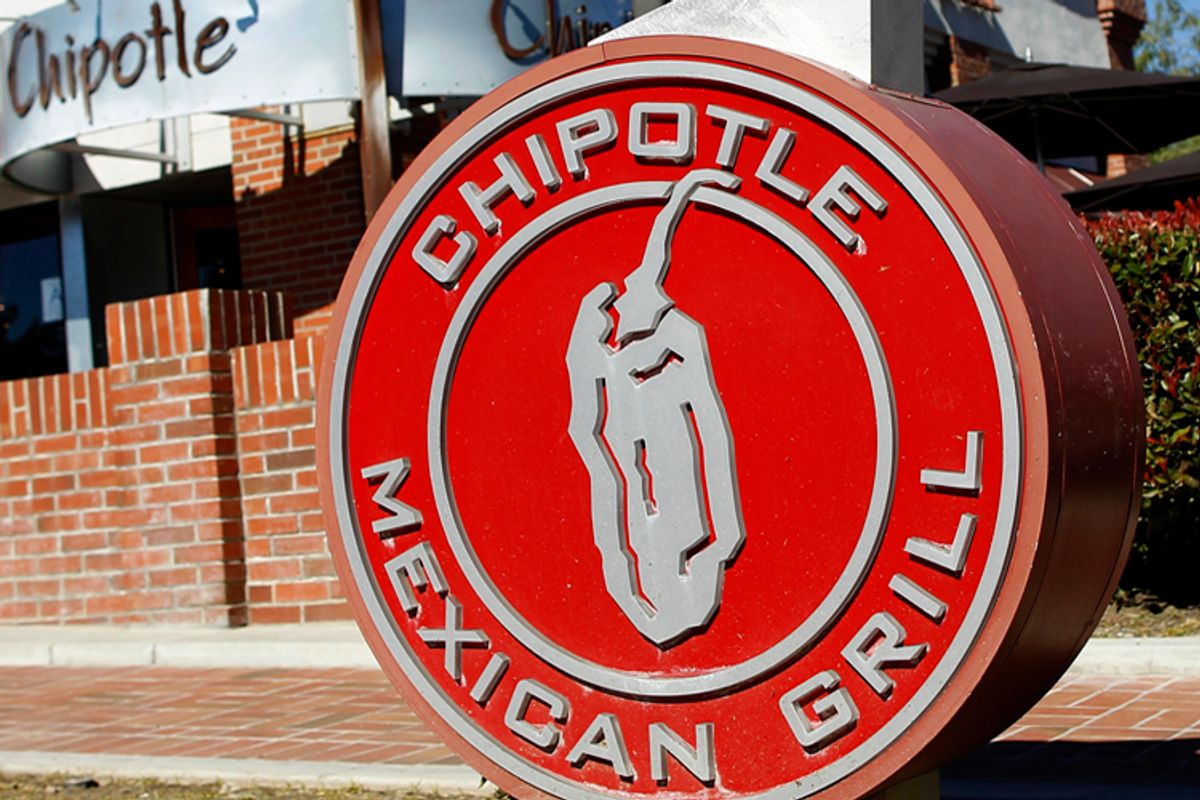Chipotle, the "fast-causal" chain widely praised for catalyzing the downfall of McDonalds, has gone (nearly) GMO-free. The company announced Monday that it's succeeded in ridding its menu of food made with genetically engineered ingredients -- a first, it says, for any national restaurant chain.
The FDA maintains that GMOs are safe, but many argue that we know little about their long-term health effects and, perhaps more pertinently, that they're an unsavory representative of industrialized agriculture. Regardless of how you feel about them, Chipotle's made it clear that they don't jibe with its "all-natural" aspirations, and their continued presence on its menu has been one of the shortcomings tripping the company up in its quest to be as ethical as possible while still serving meat.
That the aggressively enlightened chain had GMOs to begin with may strike some as surprising. And its reform emphasizes two basic truths about the modern food industry: it takes a lot of ingredients to make a "convenience food," while a lot of the basics are near-exclusively genetically modified.
Chipotle started labeling its GMO-containing ingredients online in 2013, which is how the world found out that GMOs could be found in 12 of its 24 menu options. The company relied on corn or soybean oil, or both, in its chicken, steak, fajita vegetables, rice, tortilla chips and tortillas -- and seeing as how up to 93 percent of the corn grown in the U.S., and 94 percent of soybeans, are genetically modified, going GMO-free would mean a fundamental change not just in sourcing, but in how they formulate their food.
And so the new, GMO-free Chipotle fries its chips and taco shells in sunflower oil, and, in order to meet demand, settled on rice bran oil for the adobo rub on its grilled chicken and steak. The company had to ask its suppliers to increase their production of non-GMO corn flour, but flour tortillas were harder to replace, the New York Times reports. The shortening contained soybean oil, and they couldn't replace it with lard (the vegetarians would object) or palm oil (a huge environmental no-no). The ultimate solution, the pricey non-GMO canola oil, may cause them to hike prices later this year, although they haven't as of yet.
These are problems plenty of companies that like the idea of ditching GMOs, in theory, have come up against. “Say that to live up to the promise of being non-G.M.O., you need a non-G.M.O. ingredient that accounts for just 1 percent of your formula,” Nicole Bernard Dawes, founder and chief executive of the GMO-free Late July Snacks, told the Times. “If you have a supply shortage in that ingredient, you can’t produce your product.” For a fast food company, Chipotle has an advantage in that it uses relatively few ingredients: 68 in total (46 if you don't count the tortillas, which still contain artificial additives for now). One competitor's burrito alone, the Times notes, contains 81.
Brands whose original formulations didn't take that into account are going to have a hard time retroactively eliminating them. Take Ben & Jerry's -- two years after it pledged to rid itself of GMOs, and a year later than anticipated, it managed to remove them from the ice cream add-ins, but not from the actual ice cream, because most dairy cows in the U.S. are fed with GMO corn, soybeans and alfalfa.
"Consumers don't know how difficult it is, but they also don't care how difficult it is," Joel Warady, the chief sales and marketing officer for Enjoy Life Foods, complained last year to the Wall Street Journal. "They say, 'I want the food all natural. I want it to be non-GMO. I want it to taste great. And by the way, I don't want to pay any more for that. Figure it out.' "
Chipotle gets around the cow problem by serving grass-fed beef in many of its restaurants. But because of the animal feed problem, it cautions on its website, "the meat and dairy served at Chipotle are likely to come from animals given at least some GMO feed." That means their new claims aren't technically accurate: their meat and dairy wouldn't pass the requirements of the third-party Non-GMO Project.
"We are working hard on this challenge, and have made substantial progress," it continues. But even the great Chipotle hasn't gotten there yet.



Shares